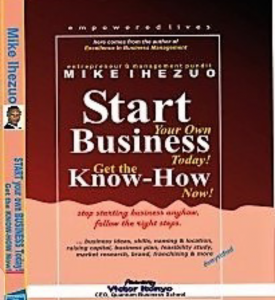Types of Entrepreneurship?
Leader Mike Ihezuo
Entrepreneurship can be categorized in different forms: sectorially or size.
Let me go classification by size:
i. Micro Business Entrepreneurship –
Micro Enterprises – this has less than 10 employees, and less than N5,000,000 (excluding land and buildings);– by Small and Medium Enterprises Development Agency (SMEDAN) 2007. It must employ person(s).
These businesses are a hairdresser, grocery store, travel agent, consultant, carpenter, plumber, electrician, etc. These people run or own their own business and hire family members or local employee. For them, the profit would be able to feed their family and not making 100 million business or taking over an industry. They fund their business by taking small business loans or loans from friends and family.
ii. Small Startup Entrepreneurship-
Small Enterprises – between 10-49 employees, and N5,000,000 to N50,000,000 (excluding land and buildings); – Small and Medium Enterprises Development Agency (SMEDAN) 2007.
This start-up entrepreneur starts a business knowing that their vision can change the world. They attract investors who think and encourage people who think out of the box.
iii. Medium Scalable Entrepreneurship:
Medium Enterprises – between 50 -199 employees, and N50,000,000 to N500,000,000 (excluding land and buildings). – Small and Medium Enterprises Development Agency (SMEDAN) 2007.
The size focuses on a scalable business and experimental models, so, they hire the best and the brightest employees. They require more venture capital to fuel and back their project or business. Most “big” companies you see are not big but medium enterprises.
The first 3 (i-iii) are what you normally read or hear government hype as MSME ie Micro (Cottage) Small Medium Enterprises. MSME form bulk of economic development across the globe.
Do you notice some of the companies you want to go and work employed less than 200 employees meaning they are MSME ie small scale business, not large. SO, and if that be the case, why not start yours? Fear…?
iv. Large Company Entrepreneurship-
These are huge companies that have defined life-cycle beyond what have been stated in i-iii above. Summarily, any company above M (medium enterprises). Most of these companies grow and are sustained by offering new and innovative products that revolve around their main products. The change in technology, customer preferences, new competition, etc., build pressure for large companies to create an innovative product and sell it to the new set of customers in the new market. To cope with the rapid technological changes, the existing organisations either buy innovation enterprises or attempt to construct the product internally. These is where big oil companies, banks, manufacturing, communication, construction, all plcs fall in here.
Understand SMEs are organizations which can best be described through their capital, scope and cost of projects, annual turnover, financial strength and number of employees amongst others.
Such coys must be registered statutorily under any part of the Companies and Allied Matters Act (CAMA) preferably on part B in order to do business in Nigeria.
The basic requirements to enable an Enterprise do business in Nigeria are:
1. registration of business name/company.
2. making of seal and stamp
3. registration of income Tax, TIN (Tax Identity Number) and VAT (Value Added Tax) with FIRS (Federal Inland Revenue Services).
4. registration of business into professional group your business belong to.
5. registration of business in the business association of locality you operate for ease of paying operation, sanitation, state and LG licenses and permit.
These makes for EASE of doing business.
Note Enterprise is not petit trading (petit (small) buying and selling).
*Question?*
Why haven’t you started one MSME? Confused? Fear? Ignorance? Need help? Or direction? Guidance? (You’re not alone.)
CONTACT Mike 09057901334




